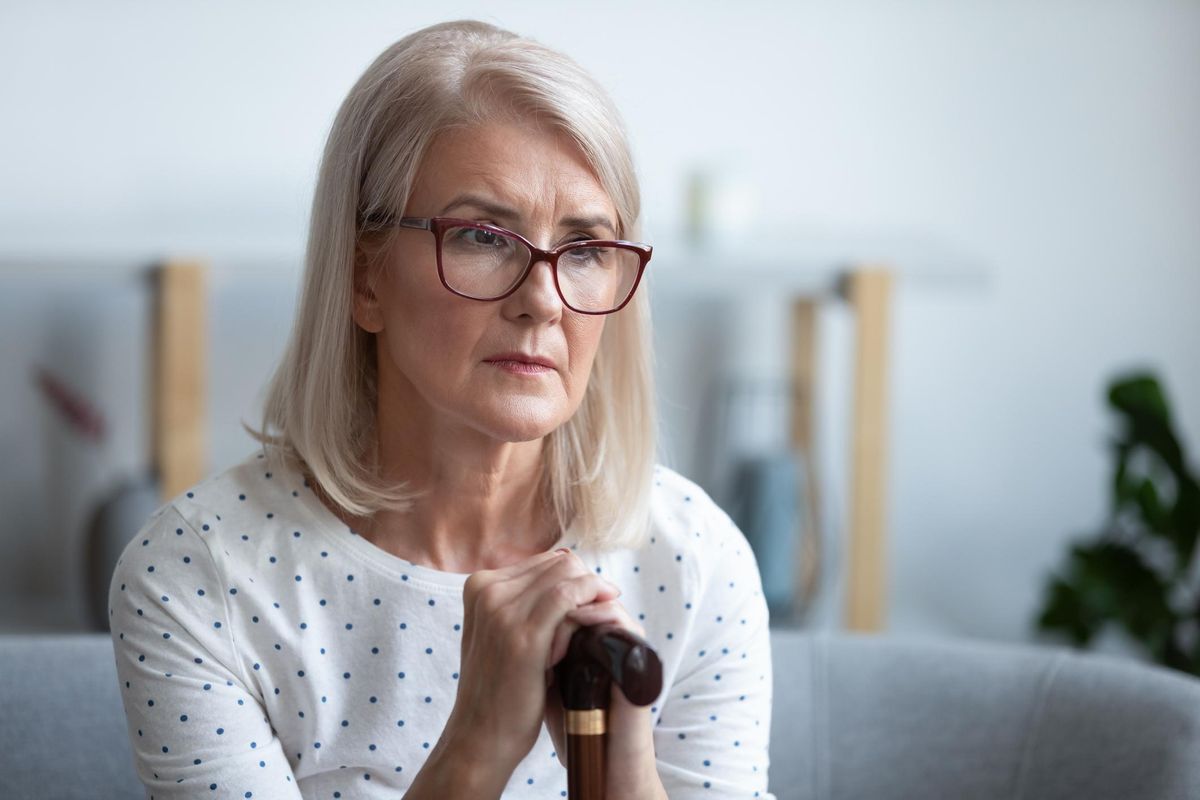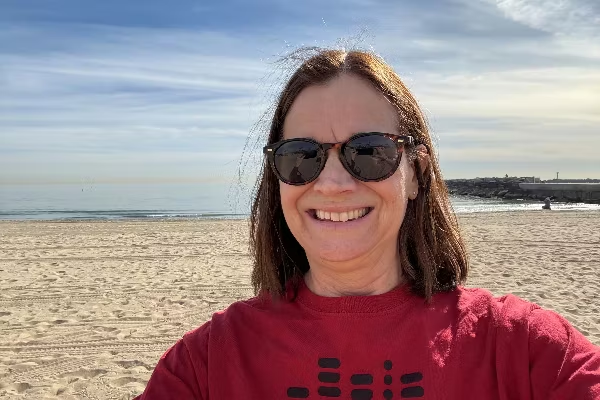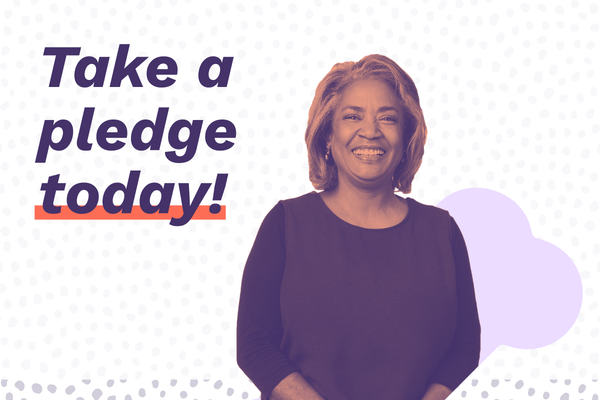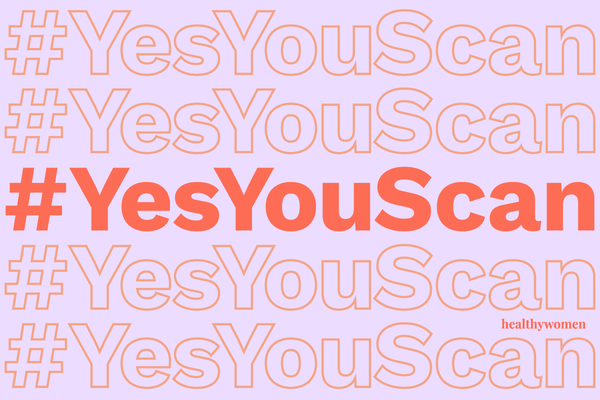To the outside world, Daniella Dayoub Forrest could be mistaken for a professional athlete.
Every day, she's intentional about what she puts into her body and the exercises she performs — and she's lived this way for close to two decades. But behind the 44-year-old's difficult workout schedule and strict eating regimen is a diagnosis that led her here. When she was 27, she was snowboarding with friends when she had a minor fall. She says most people would have gotten up from it without injury, but for her, the damage was shockingly severe and long-lasting: She suffered both a shattered tibia (shin bone) and a broken fibula (calf bone).
"The bone looked like shattered glass, and there was nothing they could do about it," Dayoub Forrest said. "It was a long recovery, and it's never been quite the same."
That's when she was diagnosed with osteoporosis, a medical condition where the bones become brittle and fragile from loss of tissue, typically as the result of hormonal changes or a lack of calcium or vitamin D. According to the National Osteoporosis Foundation, approximately 10 million Americans have the disease. Another 44 million have low bone density, placing them at increased risk of developing it.
"When I was first diagnosed, I was angry. I felt helpless," Dayoub Forrest said.
Osteoporosis is often referred to as "a silent disease" because a person typically doesn't know they have it until they experience a bone fracture or break. It is also more common in older people, specifically women, so it came as a shock when Dayoub Forrest was diagnosed at such a young age.
According to Dr. Roberto Pacifici, director of the Division of Endocrinology, Metabolism and Lipids at Emory University School of Medicine in Atlanta, there are many risk factors for osteoporosis. Two of the more significant ones are menopause or any condition that reduces the production of the female hormone estrogen, and a genetic predisposition (having genes that make it more likely you will develop the disease).
There are other risk factors that could lead to osteoporosis as well, including poor nutrition, lack of exercise, smoking and excessive drinking.
Because Dayoub Forrest's family doesn't have a history of bone density issues, she believes years of battling an eating disorder, exercising too much and smoking led to her early diagnosis of osteoporosis. It was a diagnosis that left her feeling emotionally fragile.
According to Dr. Andrea J Singer, chief medical officer at the National Osteoporosis Foundation, the psychological impact of an osteoporosis diagnosis can be different depending on the person and the stage of the disease.
"I think being diagnosed with any chronic disease can certainly take a toll. Nobody wants to think what that'll mean in terms of ongoing care, medications or if they might need to make lifestyle changes," said Dr. Singer, who is also director of bone densitometry at MedStar Georgetown University Hospital in Washington, D.C.
Lifestyle changes can vary for women diagnosed with osteoporosis. For some, it could mean changing eating and fitness habits to include more whole foods and weightlifting. For others, it could mean taking daily medication and vitamins. But for some women diagnosed with an advanced stage of the disease, it can lead to increased dependence on family and friends, which can be hard on them psychologically.
"Women are often the caregivers, and it's a role that we sometimes play with children, partners and with parents," Singer said. "And, anything that might disrupt that, or cause women to be reliant on other people, that's scary."
Singer added, "[F]or the person who takes on that caregiver role, it changes the dynamics in a relationship. There can be added stressors for that other person who now has new worries — somebody new to care for, in addition to perhaps other responsibilities and what they were doing prior."
Women can experience depression and emotional struggles because of physical changes caused by osteoporosis.
Singer described an osteoporosis patient in her 70s who had several spine fractures. She said the patient would schedule appointments at certain times of the day — early morning or late evening. One day, Singer asked her why she never scheduled her appointments around mid-day, which would make it easier for her to avoid traffic when getting to the office.
"Her spine fractures had already caused a change in height and some curvature of the spine. She didn't like the way she looked. She couldn't find clothes that fit well anymore. And she didn't want to be seen, so she chose to come at times when the waiting rooms and office would be less crowded."
Another consequence of osteoporosis is an impact on a woman's sex life.
"Mobility or positioning might be difficult in terms of normal positions for sex," Singer explained. "And again, that whole sense of self. When we see ourselves differently because of diagnoses, and if somebody is worried about being hurt or injured, that can certainly affect intimacy and relationships."
Singer also said that people often associate osteoporosis with frail older women, making women who are diagnosed — especially younger women — question their identity. Because of this, she says, there can be denial, particularly if the woman has no symptoms other than a low bone density scan.
When this happens, Singer tries to put the diagnosis in context for her patients and help them understand the risks of the disease and consequences if they don't take immediate action to prevent or reverse damage. She tries to assure her patients that knowledge is power and knowing about their diagnosis is better than not knowing, which could lead to severe injuries.
Dayoub Forrest agrees and has made it her mission to educate others, specifically women who might be living with osteoporosis. Her diagnosis inspired her to become a health coach to help people, including others with osteoporosis, realize the healthiest versions of themselves.
"There's so little assistance for women who are struggling with [osteoporosis]," Dayoub Forrest said. "There need to be better resources for people."
This resource was created with support from Amgen.
- My Family's History With Osteoporosis Changed My Medical Career ... ›
- Menopause and Osteoporosis: How to Take Charge of Your Bone ... ›
- I Have Postmenopausal Osteoporosis: What I Wish I Had Known ... ›
- Osteoporosis Isn't a Given - HealthyWomen ›
- The Osteoporosis and Depression Connection - HealthyWomen ›
- I Discovered I Had Osteoporosis When I Broke My Elbows - HealthyWomen ›
- Descubrí que tenía osteoporosis cuando tuve fracturas en mis codos por una caída - HealthyWomen ›






